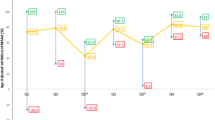Abstract
Background: Several studies have shown that inhibition of the glycoprotein IIb/IIIa receptor can reduce myocardial injury during percutaneous coronary intervention (PCI). The present study was performed to investigate platelet function, using a bedside diagnostic system, to test the hypothesis that patients with activated platelets have an increased risk for myocardial injury during PCI. Such information would be valuable to guide the PCI operator to whom he or she should give a glycoprotein IIb/IIIa inhibitor during and after the procedure.
Methods: 155 consecutive patients undergoing PCI were included in the study. 94 of the patients had stable angina pectoris and the remaining patients had unstable angina pectoris or ongoing myocardial infarction. Troponin T levels were measured in serum before PCI and at 6 am the day after PCI by an immunoassay. Platelet function was analyzed in arterial blood before PCI using the platelet function analyzer PFA-100® by Dade Behring.
Results: The platelet function analyzer PFA-100® could not discriminate between patients with or without myocardial injury during the procedure but between patients with or without acetyl salicylic acid.
Conclusion: The platelet function analyzer PFA-100® cannot be used to guide the PCI operator to whom he or she should give a glycoprotein IIb/IIIa inhibitor but the results indicate that PFA-100® can be used to monitor platelet effects of ASA therapy.
Similar content being viewed by others
References
Elwood PC, Beswick AD, Sharp DS, Yarnell JWG, Rogers S, Renaud S. Whole blood impedance platelet aggregometry and ischemic heart disease. The Caerphilly collaborative heart disease study. Arteriosclerosis1990;10:1032–1036.
Thaulow E, Erikssen J, Sandvik L, Stormorken H, Cohn PF. Blood platelet count and function are related to total and cardiovascular death in apparantly healthy men. Circulation1991;84:613–617.
Trip MD, Cats VM, van Capelle FJL, Vreeken J. Platelet hyperreactivity and prognosis in survivors of myocardial infarction. N Engl J Med1990;322:1549–1554.
Swahn E, Wallentin L. Platelet reactivity in unstable coronary artery disease. Thromb Haemost1987;57:302–305.
Itoh T, Nakai K, Ono M, Hiramori K. Can the risk for acute cardiac events in acute coronary syndrome be indicated by platelet membrane activation marker P-selectin? Coronary Artery Dis1995;6:645–650.
Antiplatelet Trialists’ Collaboration. Collaborative over-view of randomised trials of antiplatelet therapy-I Prevention of death, myocardial infarction, and stroke by prolonged antiplatelet therapy in various categories of patients. BMJ1994;308:81–106.
Lincoff MA, Califf RM, Topol EJ. Platelet glycoprotein IIb/IIIa receptor blockade in coronary artery disease. JAm Coll Cardiol2000;35:1103–1115.
Harrison P, Robinson MSC, Mackie IJ, et al. Performance of the platelet function analyser PFA-100 ® in testing abnormalities of primary haemostasis. Blood Coag Fibrinol1999;10:25–31.
Kundu SK, Heilmann EJ, Sio R, Garcia C, Davidson RM, Ostgaard RA. Description of an vitro platelet function analyzer—PFA-100®. Semin Thromb Haemost1995;21(Suppl 2):106–112.
Hézard N, Metz D, Nazeyrollas P, et al. Use of the PFA-100 apparatus to assess platelet function in patients undergoing PTCA during and after infusion of cE3 Fab in the presence of other antiplatelet agents. Thromb Haemost2000;83:540–544.
Tschoepe D, Schultheis HP, Kolarov P, et al. Platelet membrane activation markers are predictive for increased risk of acute ischemic events after PTCA. Circulation1993;88:37–42.
Samer S Kabbani, Mattew W Watkins, Taka Ashikaga, et al. Platelet reactivity characterized prospectively. Circulation2001;104:181–186.
Hamm CW, Heeschen C, Goldman B, et al., for the CAPTURE study investigators. Benefit of abciximab in patients with refractory unstable angina pectoris in relation to serum troponin T levels. N Engl J Med1999;340:1623–1629.
Patrono C, Renda G. Platelet activation and inhibition in unstable coronary syndromes. Am J Cardiol1997;80:17E–20E.
von Pape KW, Aland E, Bohner J. Platelet function analysis with PFA-100 in patients medicated with acetylsalicylic acid strongly depends on concentration of sodium citrate used for anticoagulation of blood sample. Thromb Res2000;98:295–299.
Homoncik M, Jilma B, Hergovich N, Stohlawetz P, Panzer S, Speiser W. Monitoring of aspirin (ASA) pharmacodynamics with the platelet function analyzer PFA-100. Thromb Haemost2000;83:316–321.
Califf RM, Abdelmeguid AE, Kuntz RE, et al. Myonecrosis after revascularization procedures. J Am Coll Cardiol1998;31:241–251.
Author information
Authors and Affiliations
Rights and permissions
About this article
Cite this article
Saleh, N., Hansson, LO., Kohut, M. et al. Platelet Function and Myocardial Injury During Percutaneous Coronary Intervention. J Thromb Thrombolysis 13, 69–73 (2002). https://doi.org/10.1023/A:1016238612418
Issue Date:
DOI: https://doi.org/10.1023/A:1016238612418



